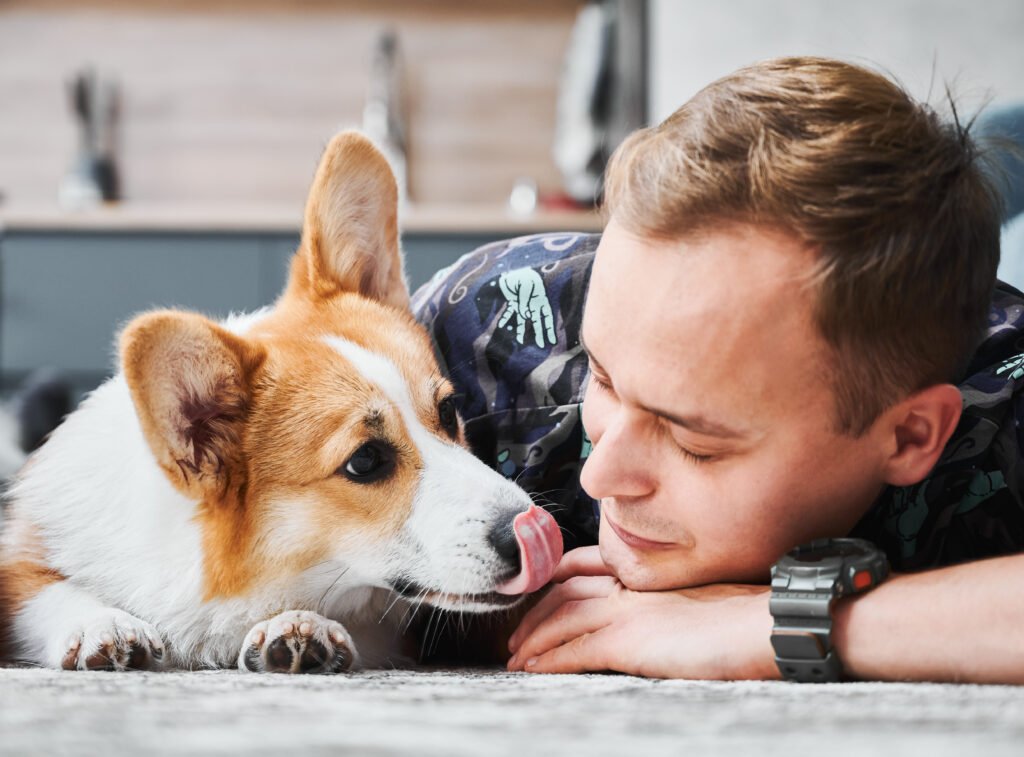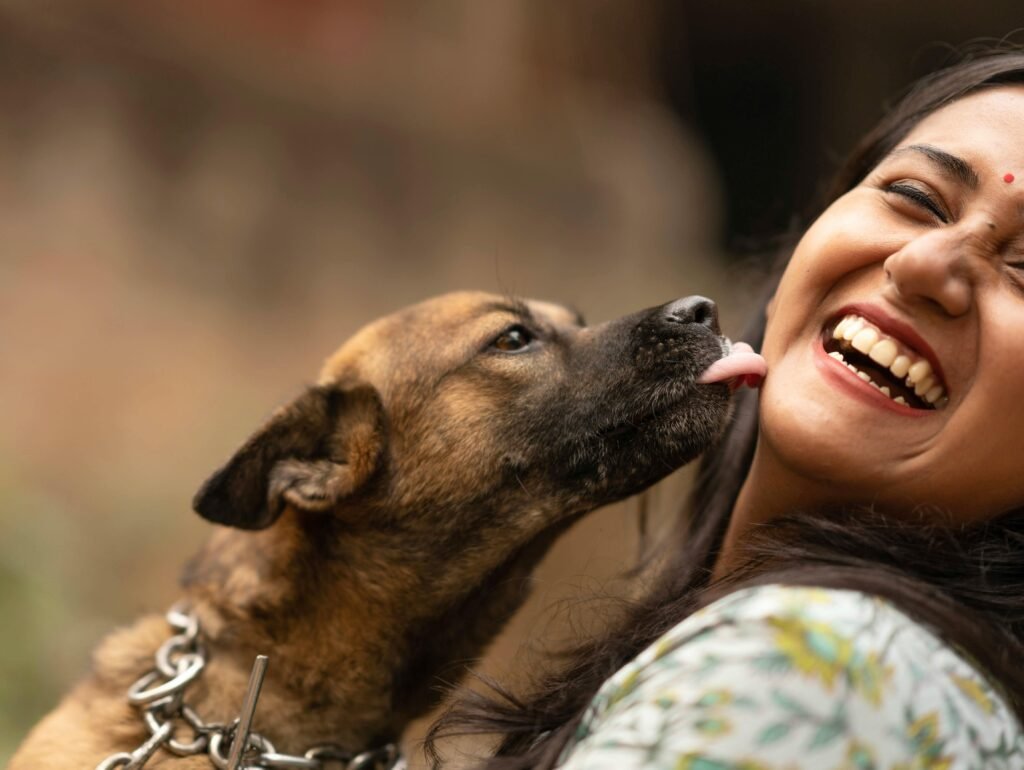If you’re a dog owner, you’ve likely experienced that slobbery, affectionate moment Why Does My Dog Lick Me So Much on My Face, While it can be cute and endearing (or maybe a little sticky and gross), it often leaves us wondering, “Why does my dog do this so much?” Is it their way of saying “I love you,” or is something deeper going on?
Dogs lick faces for various reasons, and understanding this behavior can deepen your relationship with your furry friend. With that in mind, this article dives deep into the reasons behind face licking, from expressing affection to dealing with anxiety. It gives you tips for managing it if it becomes excessive.
Understanding Why Does My Dog Lick Me So Much on My Face
1. They’re Showing You Affection
One of the most heartwarming reasons Why Does My Dog Lick Me So Much on My Face is to show love and affection. For dogs, licking is similar to how we express our affection through hugs, kisses, or pats on the back. It’s a natural way for them to bond with you.
This behavior starts when they’re still puppies. Mother dogs lick their newborn pups to clean them, stimulate breathing, and show maternal care. Dogs grow up understanding that licking signifies love and nurture. When your dog licks your face, they may be trying to recreate that feeling of comfort and security they had as puppies.
The Science of Dog Love
Studies suggest that the act of licking can release feel-good hormones like oxytocin in both dogs and humans. Oxytocin, often called the “love hormone,” strengthens bonds between animals and their owners. When your dog licks you, they may feel calmer and happier.
How You Can Respond
- Appreciate it: If you enjoy these lick-kisses, give your dog a scratch or pat as favorable reinforcement. They’ll associate their affectionate behavior with your love in return.
- Set limits: If the licking gets to be too much for you, it’s okay to gently redirect them to another activity (more on that later).
2. They’re Trying to Communicate
Dogs can’t talk like humans, though sometimes we wish they could! Instead, they speak to us through body language, barking, and licking. When your dog licks your face, they might tell you something important.
What They Might Be Saying
- “I miss you!” Dogs often lick their owners’ faces when they reunite after being apart. It’s their way of saying, “I’m so happy to see you again!”
- “I need something.” Your dog may also be using face licking as a polite way to ask for something, whether it’s food, water, or a walk.
- “Are you okay?” Dogs are incredibly intuitive about human emotions. If you’re stressed or sad, your dog might lick your face to reassure you.
How Dogs Learn to Use Licking as Language
Pack animals like wolves and wild dogs use licking to communicate within their groups. Puppies often lick the mouths of adult dogs as a greeting or to ask for food. This behavior becomes part of their social repertoire, and domestic dogs use it with humans to convey similar messages.
What You Can Do
- Watch for cues: Pay attention to other signals your dog gives you alongside the licking, such as wagging tails, playful jumping, or whining. These might give you more clues about what they’re trying to say.
- Respond accordingly: If they need something, ensure their needs are met. If they’re just being affectionate, take a moment to enjoy their love!
3. Your Face Tastes Interesting (Or Delicious)
Here’s a less romantic but equally likely explanation for why your dog might want to cover your face in licks: they like how you taste. Our skin has natural oils, salty residue from sweat, and sometimes even traces of food or lotion that dogs find appealing.
Dogs Have Super Senses
A dog’s sense of smell is its superpower. It has up to 300 million olfactory receptors in its nose, compared to our measly 5 million. The dog’s ability to detect scents is tied directly to its brain, which processes smells thousands of times more effectively than we do. When dogs lick, they combine their sense of taste with their elite sniffing skills.
Practical Examples
- After a workout or sunny day, your face likely has traces of salt from sweat. To your dog, this might taste like a special treat.
- If you’ve been cooking, even tiny particles of food that are invisible to you might catch their attention.
What You Can Do
- Wash up: If you don’t want your dog licking you excessively, especially for this reason, try washing your face regularly, especially after meals or exercise.
- Keep skincare safe: Be mindful of lotions or creams you use. Some could be irritating or even toxic for dogs if licked repeatedly.
4. It’s Instinctual Behavior
Licking is a natural behavior for dogs that dates back to their wild ancestors. Wolves and wild dogs often lick each other for various reasons, many of which have been passed down to our domestic pets.
Why Do Wild Dogs Lick?
- Grooming and bonding: Wolves and wild dogs groom each other by licking, creating trust, and strengthening social connections.
- Food sharing: Puppies in the wild lick their mothers’ mouths to encourage them to regurgitate food. While domestic dogs no longer rely on this behavior for survival, it’s still an instinct that hasn’t completely faded.
- Showing respect: Submissive dogs in a pack often lick the faces of stronger, dominant ones as a sign of respect and acknowledgment.
Your Dog’s Instincts at Play
Your dog isn’t asking you to regurgitate dinner; don’t worry! But when they lick your face, they tap into these deeply ingrained, instinctual behaviors to bond with you and show their trust.
5. It’s a Way to Relieve Stress or Anxiety
Licking can also act as a coping mechanism for dogs. It can be soothing, almost like how some people bite their nails or tap their feet when nervous.
Self-Soothing Behavior
It might find comfort in the act if your dog licks your face repeatedly during high-stress situations (like fireworks or thunderstorms). Licking releases feel-good chemicals in its brain, making it feel calmer.
When to Worry
While some stress-related licking is normal, excessive licking can sometimes be a sign of deeper issues like separation anxiety, boredom, or compulsive behaviors.

What You Can Do
- Offer comfort: If your dog is licking you for comfort, reassure them through cuddles or calming verbal cues.
- Distract and redirect: Offer a chew toy, treat, or puzzle game to shift their focus and ease their nerves.
- Consult your vet: Persistent excessive licking might warrant a check-up to rule out anxiety or other health concerns.
6. They’re Naturally Curious
Dogs are curious creatures by nature. They interact with the world through their sense of smell and touch, and licking is an extension of that.
Exploring You and Your World
Your face is exciting to a dog because it’s the source of emotions, expressions, and scents. Licking your face after you’ve returned from outside could be their way of asking, “Where have you been? What did you do? Who did you meet?” It’s their version of an investigative report.
How They Learn About You
Dogs can even detect emotions and hormones through licking. If you’re happy, stressed, or sad, your dog might be able to detect these changes and respond accordingly.
How to Manage Excessive Face Licking
While dogs lick primarily out of love and curiosity, it’s not always convenient, particularly if it becomes excessive. Here are some tips to curb the habit:
Training Techniques
- Use Commands: Teach your dog cues like “No lick” or “Stop.” Reward them with treats when they listen.
- Ignore the Behavior: If your dog is licking for attention, don’t give them the reaction they want. Walk away and only engage when they stop.
- Distract Them: Offer a toy, a treat, or a long walk to redirect their energy elsewhere.
Understanding Triggers
- Identify Patterns: Is your dog licking more during high-stress times? Are they bored or overly energetic? Recognizing what prompts the licking can help you address the root cause.
- Enrich Their Lives: Dogs, especially high-energy breeds, need plenty of mental and physical stimulation. Boredom can often lead to excessive licking.

Conclusion
Your dog’s face-licking habit may be their endearing way of saying, “You’re my favorite human!” This quirky behavior is usually harmless, whether it’s their way of showing love, communicating, or exploring the world. However, if it becomes too much, you now have tools to manage and redirect those slobbery affections.
Dogs express love uniquely, and learning to understand them strengthens your bond. And hey, a couple of wet kisses is worth all the unconditional love they give!
